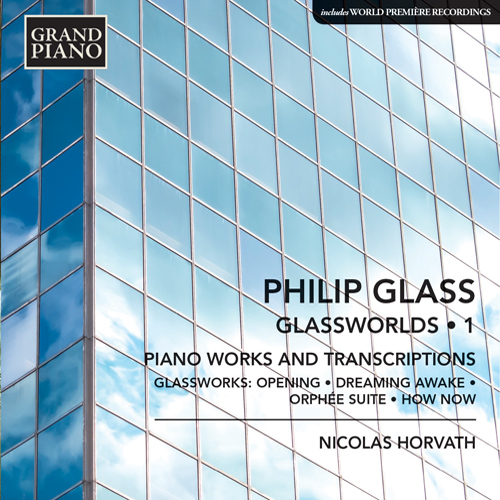
About this Release
GLASS, PHILIP (b. 1937)
Glassworlds • 1
- Nicolas Horvath, piano
Philip Glass has made an immense and stylistically wide-ranging contribution to piano repertoire. The Orphée Suite, a transcription of excerpts from the first opera in Glass’ Cocteau Trilogy, is one of his most distinctive piano pieces, blending virtuosity and melodic richness. In contrast, the hypnotic How Now is structurally influenced by Indian ragas and gamelan music, whilst Dreaming Awake contains one of the most powerful climaxes in all Glass’ works. Performed by Nicolas Horvath, a Scriabin Competition first prize winner, this is the first release in the complete Glass solo piano edition which will include many premières.
This recording was made on a modern instrument: Fazioli Grand Piano 2780649
Tracklist
|
1
Glassworks: I. Opening (1981) (00:06:17)
|
|
Orphee Suite (arr. P. Barnes for piano) (2000) (00:00:00 )
|
|
2
I. The Cafe (00:04:41)
|
|
3
II. Orphee's Bedroom (00:01:34)
|
|
4
III. Journey to the Underworld (00:03:22)
|
|
5
IV. Orphee and the Princess (00:04:08)
|
|
6
V. Return to Orphee's House (00:02:41)
|
|
7
VI. Orphee's Return (00:06:58)
|
|
8
VII. Orphee's Bedroom-Reprise (00:03:53)
|
|
9
Dreaming Awake (2003) * (00:14:48)
|
|
10
How Now (1968) (00:30:38)
|
The Artist(s)
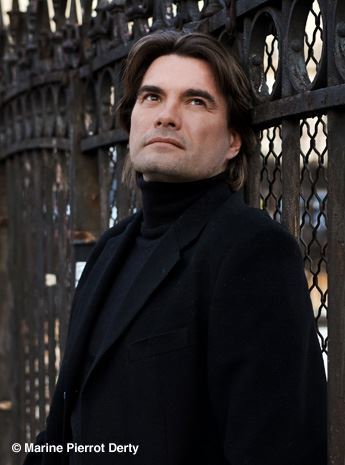 Nicolas Horvath began his music studies at Monaco’s Académie de Musique et de Théâtre Prince Rainier III and soon began to make an impression on a number of artists who would become his mentors. Aged 16 he caught the attention of the American conductor Lawrence Foster before coming to the notice of several distinguished international pianists, including Liszt specialist Leslie Howard. He is the recipient of numerous awards, including First Prize at both the Scriabin and the Luigi Nono International Competitions. He has become noted for hosting concerts of unusual length, sometimes lasting over twelve hours, such as the overnight performance of the complete piano music of Erik Satie at the Paris Philharmonie before a cumulative audience of 14,000 people. In 2019 he performed alongside Philip Glass at the same venue in a programme devoted to the American composer’s piano music. Horvath’s extensive and varied discography on Grand Piano includes the highly acclaimed Philip Glass solo piano music edition, Glassworlds; the complete piano works of Erik Satie; piano sonatas by the Estonian composer Jaan Rääts and music by the American experimental composer Alvin Lucier; Carl Czerny’s 30 Études; and lesser-known piano music by Claude Debussey, Anne-Louise Brillion de Jouy and Hélène de Montgeroult. Nicolas is a Steinway Artist.
Nicolas Horvath began his music studies at Monaco’s Académie de Musique et de Théâtre Prince Rainier III and soon began to make an impression on a number of artists who would become his mentors. Aged 16 he caught the attention of the American conductor Lawrence Foster before coming to the notice of several distinguished international pianists, including Liszt specialist Leslie Howard. He is the recipient of numerous awards, including First Prize at both the Scriabin and the Luigi Nono International Competitions. He has become noted for hosting concerts of unusual length, sometimes lasting over twelve hours, such as the overnight performance of the complete piano music of Erik Satie at the Paris Philharmonie before a cumulative audience of 14,000 people. In 2019 he performed alongside Philip Glass at the same venue in a programme devoted to the American composer’s piano music. Horvath’s extensive and varied discography on Grand Piano includes the highly acclaimed Philip Glass solo piano music edition, Glassworlds; the complete piano works of Erik Satie; piano sonatas by the Estonian composer Jaan Rääts and music by the American experimental composer Alvin Lucier; Carl Czerny’s 30 Études; and lesser-known piano music by Claude Debussey, Anne-Louise Brillion de Jouy and Hélène de Montgeroult. Nicolas is a Steinway Artist. The Composer(s)
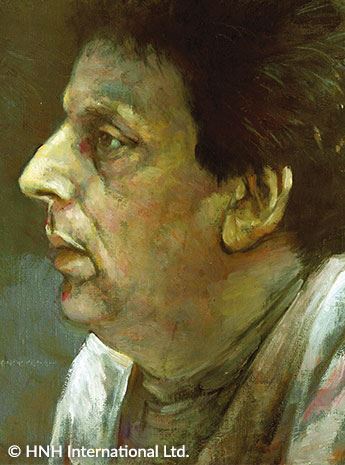 Piano is Philip Glass’ primary instrument (he also studied violin and flute); he composes at the keyboard. With its seemingly contradictory elements of lyricism and percussiveness, it is in some ways the ideal medium for Glass’ musical language. With its deep roots in tradition (spanning the Classical, Romantic and Modern eras), the instrument embodies the composer’s desire to merge new ideas with classic forms. It is perhaps via piano (and, by extension, keyboard) that performers and listeners can make the most direct and personal contact with Glass’ musical genius.
Piano is Philip Glass’ primary instrument (he also studied violin and flute); he composes at the keyboard. With its seemingly contradictory elements of lyricism and percussiveness, it is in some ways the ideal medium for Glass’ musical language. With its deep roots in tradition (spanning the Classical, Romantic and Modern eras), the instrument embodies the composer’s desire to merge new ideas with classic forms. It is perhaps via piano (and, by extension, keyboard) that performers and listeners can make the most direct and personal contact with Glass’ musical genius. Reviews
“For all the piano lovers and contemporary music, this CD is a must have.” – AudioNec
“Pianist Nicolas Horvath exhibits skill and inventiveness in his performance, qualities which allow him to go wherever the music leads.” – Scene Magazine

“Somehow, the objectivity of the sound of a piano suits the music of Philip Glass perfectly. Certainly that’s how it seems in Nicolas Horvath’s expert performances on this…” – International Piano
“The technical challenge to the pianist is huge, but causes no problems to the Monegasque pianist Nicolas Horvath. His virtuosity is astounding.” – Pizzicato

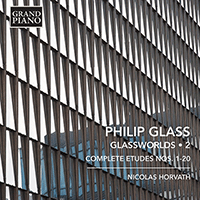
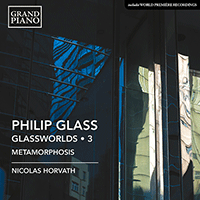
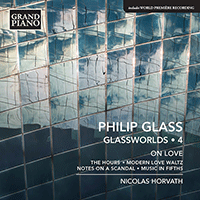
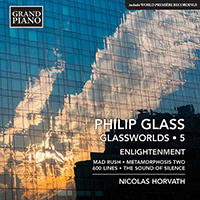
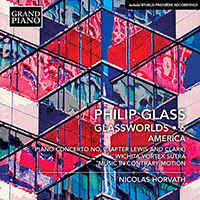
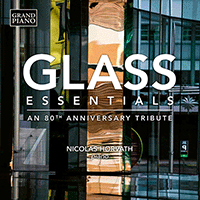
 Grand Piano has gained a reputation for producing high quality recordings of rare keyboard gems. Dedicated to the exploration of undiscovered piano repertoire, the label specialises in complete cycles of piano works by many lesser-known composers, whose output might otherwise have remained unknown and unrecorded.
Grand Piano has gained a reputation for producing high quality recordings of rare keyboard gems. Dedicated to the exploration of undiscovered piano repertoire, the label specialises in complete cycles of piano works by many lesser-known composers, whose output might otherwise have remained unknown and unrecorded.






